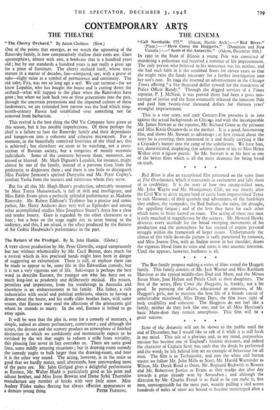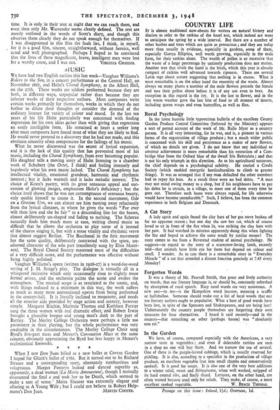THE CINEMA
"Call Northside 777." (Odeon, Marble Arch.) " Red River." (Plaza.)—" Here Come the Huggetts." (Dominion and New
Victoria.)—" Scott of the Antarctic." (Odeon, December 30th.) IN 1932 in the State of Illinois a young Pole was convicted of murdering a policeman and received a sentence of life imprisonment. The only person who believed in his innocence was his mother, and she had such faith in it she scrubbed floors for eleven years so that She might raise the funds necessary for a further investigation into her son's case. In I944 she inserted an advertisement in the Chicago Times offering "a five thousand dollar reward for the murderers of Police Officer Bundy." Through the dogged services of a Times reporter, P. J. McNeal, it was proved there had been a gross mis- carriage of justice and the State eventually released the innocent Pole and paid him twenty-four thousand dollars for thirteen years' wrongful imprisonment.
This is a true story, and zoth Century-Fox presents it in toto against the actual backgrounds in Chicago and with the incomparable Mr. James Stewart as the reporter, Mr. Richard Conte as the prisoner and Miss Kasia Orzazewski as the mother. It is a good, fast-moving film, and shows Mr. Stewart to advantage ; at first cynical about the story he is covering, then interested in it and finally carrying it like a Crusader's banner into the camp of the unbelievers. We have him, too, domesticated, displaying that solemn charm of his to Miss Helen Walker over a jigsaw puzzle. So Mr. Stewart is at his best in one of the better films which is all the more dramatic for being based on truth.
* * * * Red River is also an exceptional film patterned on the same lines as The Overlanders, which it transcends in excitement and falls short of in credibility. It is the story of how two strong-willed men, Mr. John Wayne and Mr. Montgomery Clift, set out shortly after the Civil War to drive to,000 head of cattle from impoverished Texas to rich Missouri ; of their quarrels and adventures, of the hardships they endure, the stampedes, the Red Indians, the rains, the drought, the appalling fatigue ; and of the love they have for each other which turns to bitter hatred en route. The acting of these two men is only matched in magnificence by the scenery. Mr. Howard Hawks deserves every accolade for the broad sweeping movements of his production and the atmosphere he has created cf urgent personal struggle within the framework of larger issues. Unfortunately the climax of this virile do-or-die picture is sadly punctured by romance, and Miss Joanne Dru, with an Indian arrow in her shoulder, draws the vigorous blood from its veins and turns it into anaemic nonsense. Until she appears, however, beefiness is all.
* * * * * * Scott of the Antarctic will not be shown to the public until the end of December, but I would like to talk of it while it is still fresh in my mind. This tale of a glorious and, to my mind, purposeless mission has become one of England's historic treasures, and indeed the character of Captain Scott was such that the deeds he performed and the word§ he left behind him set an example of behaviour for all men. The film is in Technicolor, and into the white and barren wastes we follow Mr. John Mills as Scott, Mr. Harold Warrender as Wilson, Mr. Derek Bond as Oates, Mr. Reginald Beckwith as Bowers and Mr. Robertson Justice as Evans as they trudge day after day towards a prize already won by Amundsen ; and although the direction by Mr. Charles Frend is as fluid as he can make it, five men, unrecognisable for the most part, wearily pulling a sled across hundreds of miles of snow are bound to become stereotyped after a The Box family propose making a series of films round the Lluggett family. This family consists of Mr. Jack Warner and Miss Kathleen Harrison as the typical middle-class Dad and Mum, and the Misses Susan Shaw, Jane Hylton and Petula Clark as their daughters. The first of the series, Here Come the Huggetts, is, frankly, not a bit good. In pursuing the affairs, educational or amorous, of Mr. Huggett's girls, not to mention the love life of a blonde cousin of unbelievable minichood, Miss Diana Dors, the film loses sight of both credibility and cohesion. The Huggetts do not feel like a family, neither do they look like one, and for all Miss Harrison's basic Mum-dom they remain amorphous. This film will be a great success. time. It is only in their tent at night that we can reach them, and even then only Mr. Warrender seems clearly defined. The rest are mostly outlined in the words of Scott's diary, _and though this observes them clearly they do not speak enough for themselves. If I was disappointed in this film the fault lies, I think, in myself, for it is a good film, sincere, straightforward, without heroics, well acted and well photographed. Perhaps I hoped to be convinced that the lives of these magnificent, brave, intelligent men were lost



































 Previous page
Previous page